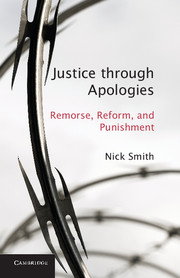2 - Against Court-Ordered Apologies
Published online by Cambridge University Press: 05 June 2014
Summary
They wanted a statement saying that I was sorry for the crimes that I had committed against North Vietnamese people and that I was grateful for the treatment that I had received from them…I held out for four days. Finally, I reached the lowest point of my 5½ years in North Vietnam. I was at the point of suicide, because I saw that I was reaching the end of my rope. I said, O.K., I’ll write for them. They took me up into one of the interrogation rooms, and for the next 12 hours we wrote and rewrote. The North Vietnamese interrogator, who was pretty stupid, wrote the final confession, and I signed it. It was in their language, and spoke about black crimes, and other generalities.…I kept saying to myself, “Oh, God, I really didn't have any choice.” I had learned what we all learned over there: Every man has his breaking point. I had reached mine.
Senator John McCainConsider the case of Rickey Sharratt. A Washington state jury found twenty-nine-year-old Sharratt guilty of the misdemeanor crime of destroying state land by illegally driving his four-wheel drive truck through protected forests. In an effort to “get its message out” regarding the penalties for illegal off-roading, an official from the Department of Natural Resources suggested requiring Sharratt to apologize and upload the video of his statement. YouTube seemed to be an especially appropriate forum because off-roaders often post videos of their outings, and having Sharratt's apology appear alongside clips that glorify the illegal activity could reach the targeted audience. Clark County District Court Judge James Swanger offered Sharratt a choice: serve five days on a work crew or apologize on video.
- Type
- Chapter
- Information
- Justice through ApologiesRemorse, Reform, and Punishment, pp. 51 - 93Publisher: Cambridge University PressPrint publication year: 2014



